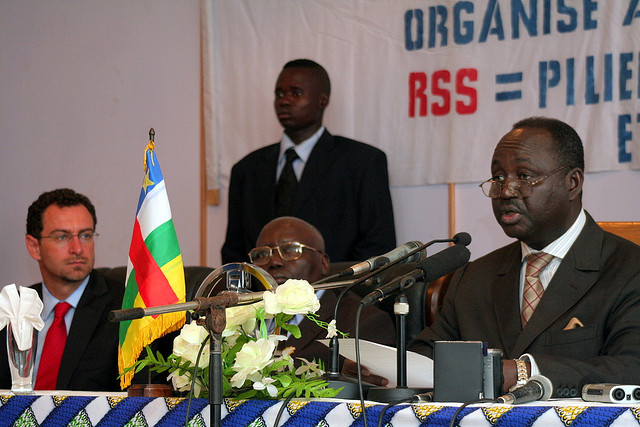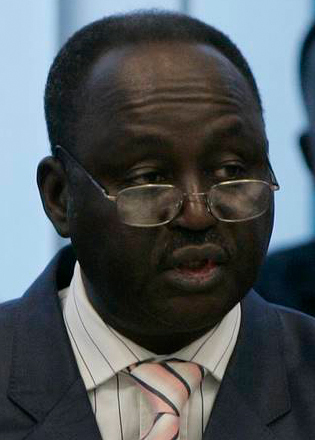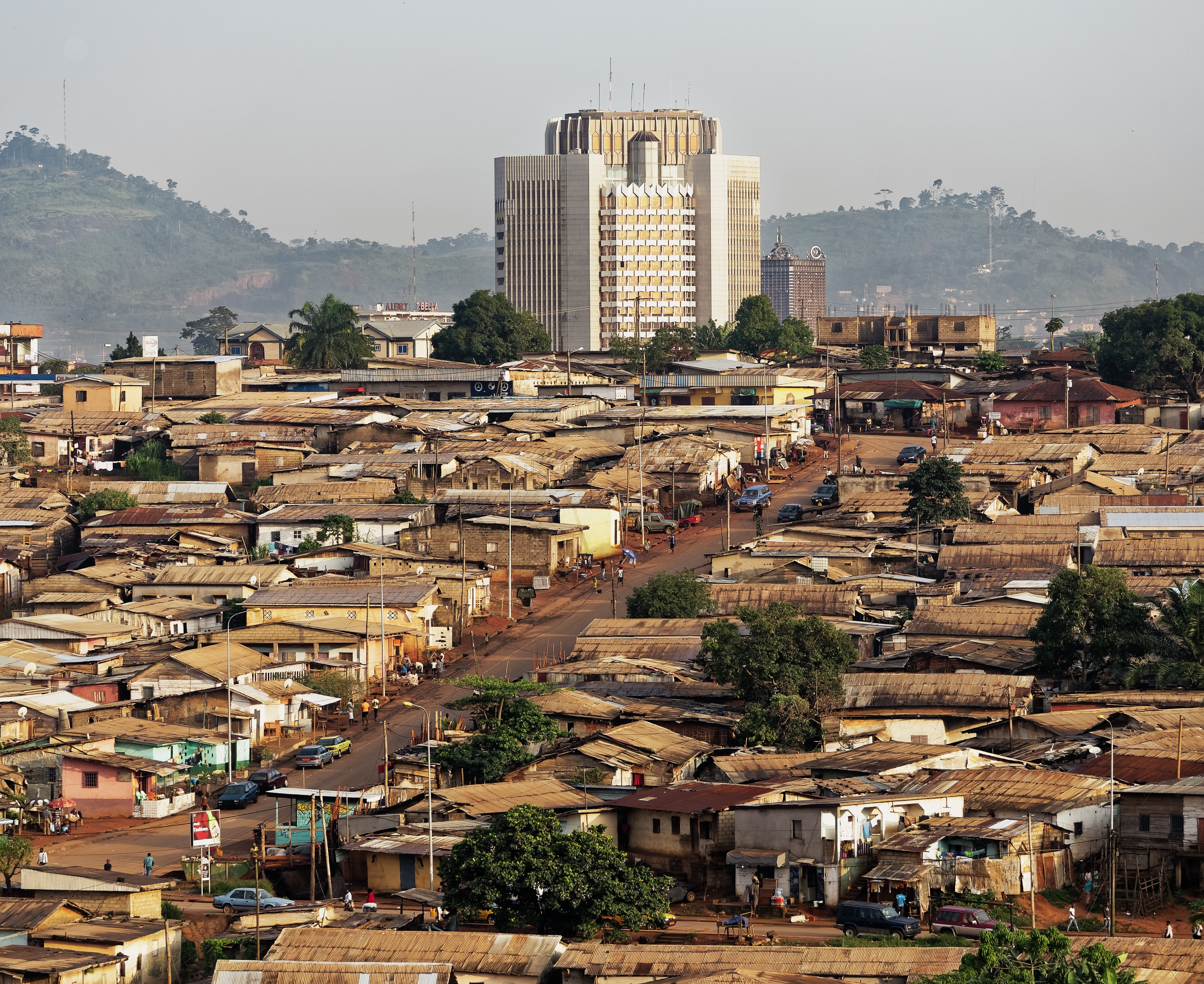|
Enoch Derant Lakoué
Enoch Derant Lakoué (born 5 October 1944) is a Central African politician who was Prime Minister of the Central African Republic from 26 February 1993 to 25 October 1993. Early life Lakoué was born on 5 October 1944 in Fort Lamy (now N'Djamena), Chad. He is a member of the Gbaya ethnic group. From 1960 to 1962 he studied at the Lycée Emile-Gentil in Bangui and subsequently studied economics.Bradshaw & Fandos-Rius 2016, p. 390 Political career He was appointed deputy director of trade and industry on 16 February 1968, and was promoted to director of industry on 1 February 1969. President Jean-Bedel Bokassa named Lakoué minister of transportation on 25 June 1970. He was named industry minister on 19 August and trade minister on 25 November. Lakoué was appointed minister of finance, industry, and trade on 29 December 1971, serving in this role until 27 October 1972. Afterwards he served as director general of the Banque de developpement des etats de l'Afrique centrale (BDEAC) ... [...More Info...] [...Related Items...] OR: [Wikipedia] [Google] [Baidu] |
Prime Minister Of The Central African Republic
This article lists the heads of government of the Central African Republic. There have been twenty-five heads of government of the Central African Republic and the Central African Empire. The office of Prime Minister, the head of government, was created when the Central African Republic became an autonomous territory of France in December 1958. It was originally the highest post of the Central African Republic, though France did maintain a governor in the territory. After the Central African Republic declared its independence and became a republic on 13 August 1960, David Dacko held both the Prime Minister and newly created President of the Central African Republic posts briefly before eliminating the Prime Minister position and placing all executive power in the office of the President. President Jean-Bédel Bokassa restored the office of Prime Minister to assist him in governing the country in 1975, shortly before he declared himself Emperor. He selected Elisabeth Domitien to ... [...More Info...] [...Related Items...] OR: [Wikipedia] [Google] [Baidu] |
United Nations Development Program
The United Nations Development Programme (UNDP)french: Programme des Nations unies pour le développement, PNUD is a United Nations agency tasked with helping countries eliminate poverty and achieve sustainable economic growth and human development. Headquartered in New York City, it is the largest UN development aid agency, with offices in 170 countries. The UNDP emphasizes developing local capacity towards long-term self-sufficiency and prosperity. It administers projects to attract investment, technical training, and technological development, and provides experts to help build legal and political institutions and expand the private sector. The UNDP operates in 177 countries and is funded entirely by voluntary contributions from UN member states. Also, UNDP is governed by a 36-member executive board overseen by an administrator, who is third-highest ranking UN official after the Secretary-General and Deputy Secretary-General. Founding The UNDP was founded on 22 Nove ... [...More Info...] [...Related Items...] OR: [Wikipedia] [Google] [Baidu] |
Finance Ministers Of The Central African Republic
Finance is the study and discipline of money, currency and capital assets. It is related to, but not synonymous with economics, the study of production, distribution, and consumption of money, assets, goods and services (the discipline of financial economics bridges the two). Finance activities take place in financial systems at various scopes, thus the field can be roughly divided into personal, corporate, and public finance. In a financial system, assets are bought, sold, or traded as financial instruments, such as currencies, loans, bonds, shares, stocks, options, futures, etc. Assets can also be banked, invested, and insured to maximize value and minimize loss. In practice, risks are always present in any financial action and entities. A broad range of subfields within finance exist due to its wide scope. Asset, money, risk and investment management aim to maximize value and minimize volatility. Financial analysis is viability, stability, and profitability asse ... [...More Info...] [...Related Items...] OR: [Wikipedia] [Google] [Baidu] |
Living People
Related categories * :Year of birth missing (living people) / :Year of birth unknown * :Date of birth missing (living people) / :Date of birth unknown * :Place of birth missing (living people) / :Place of birth unknown * :Year of death missing / :Year of death unknown * :Date of death missing / :Date of death unknown * :Place of death missing / :Place of death unknown * :Missing middle or first names See also * :Dead people * :Template:L, which generates this category or death years, and birth year and sort keys. : {{DEFAULTSORT:Living people 21st-century people People by status ... [...More Info...] [...Related Items...] OR: [Wikipedia] [Google] [Baidu] |
1944 Births
Events Below, the events of World War II have the "WWII" prefix. January * January 2 – WWII: ** Free France, Free French General Jean de Lattre de Tassigny is appointed to command First Army (France), French Army B, part of the Sixth United States Army Group in North Africa. ** Landing at Saidor: 13,000 US and Australian troops land on Papua New Guinea, in an attempt to cut off a Japanese retreat. * January 8 – WWII: Philippine Commonwealth troops enter the province of Ilocos Sur in northern Luzon and attack Japanese forces. * January 11 ** President of the United States Franklin D. Roosevelt proposes a Second Bill of Rights for social and economic security, in his State of the Union address. ** The Nazi German administration expands Kraków-Płaszów concentration camp into the larger standalone ''Konzentrationslager Plaszow bei Krakau'' in occupied Poland. * January 12 – WWII: Winston Churchill and Charles de Gaulle begin a 2-day conference in Marrakech ... [...More Info...] [...Related Items...] OR: [Wikipedia] [Google] [Baidu] |
François Bozizé
François Bozizé Yangouvonda (born 14 October 1946) is a Central African politician who was President of the Central African Republic from 2003 to 2013. Bozizé rose to become a high-ranking army officer in the 1970s, under the rule of Jean-Bédel Bokassa. After Bokassa was ousted, Bozizé served in the government as Minister of Defense from 1979 to 1981 and as Minister of Information from 1981 to 1982. He participated in a failed 1982 coup attempt against President André Kolingba and subsequently fled the country. Years later, he served as Army Chief of Staff under President Ange-Félix Patassé, but he began a rebellion against Patassé in 2001. Bozizé's forces captured the capital, Bangui, in March 2003, while Patassé was outside the country, and Bozizé took power, ushering in a transitional period of government. He won the March–May 2005 presidential election in a second round of voting, and he was re-elected in the January 2011 presidential election, winning the vo ... [...More Info...] [...Related Items...] OR: [Wikipedia] [Google] [Baidu] |
2005 Central African Republic General Election
General elections were held in the Central African Republic on March 13, 2005 to elect the President and National Assembly. A second round was held for both elections on May 8, marking the end of the transitional process that began with the seizure of power by François Bozizé in a March 2003 coup, overthrowing President Ange-Félix Patassé. A new constitution was approved in a referendum in December 2004 and took effect the same month. The presidential elections saw Bozizé attempt to win a five-year term after two years as transitional leader, alongside ten other candidates, with Patassé excluded from running. As no candidate received over 50% of the vote in the first round, a runoff was held between Bozizé and former Prime Minister Martin Ziguélé, resulting in a victory for Bozizé, who received 64.6% of the vote. He was inaugurated on 11 June. In the simultaneous parliamentary elections, the National Convergence "Kwa Na Kwa" party emerged as the largest in the National ... [...More Info...] [...Related Items...] OR: [Wikipedia] [Google] [Baidu] |
Bank Of Central African States
The Bank of Central African States (french: Banque des États de l'Afrique Centrale, BEAC) is a central bank that serves six central African countries which form the Economic and Monetary Community of Central Africa: *Cameroon *Central African Republic * Chad * Equatorial Guinea *Gabon * Republic of the Congo In December 2010, a WikiLeaks memo dated June 3, 2005, said that Gabonese officials working for the Bank of Central African States stole US$36 million over a period of five years from the pooled reserves, giving much of the money to members of France's two main political parties. Governors Philibert Andzembe of Gabon was Governor of the Bank of Central African States from July 2007 until October 2009, when he was fired by the new president of Gabon, Ali Bongo, in response to a bank scandal in which $28.3 million went missing from the bank's Paris branch. Jean Félix Mamalepot, also from Gabon, was Governor for the preceding 17 years. [...More Info...] [...Related Items...] OR: [Wikipedia] [Google] [Baidu] |
1999 Central African Republic Presidential Election
Presidential elections were held in the Central African Republic on 19 September 1999. The result was a victory for incumbent President Ange-Félix Patassé of the Movement for the Liberation of the Central African People, who received 51.33% of the vote in the first round, meaning that a second round was not required. Voter turnout was 59.1%. Prior to Constitutional Court head Édouard Frank announcing the results, all nine opposition candidates rejected the outcome, claiming the elections were rigged. However, observers stated that any malpractice was not enough to have changed the results. '''' 3 October 1999 Results |
1993 Central African Republic General Election
General elections were held to in the Central African Republic on 22 August 1993, with a second round on 19 September 1993. They followed the previous year's elections, the results of which had been voided by the Supreme Court due to irregularities. The presidential elections were won by Ange-Félix Patassé of the Movement for the Liberation of the Central African People, who defeated Patriotic Front for Progress leader Abel Goumba in the second round. Incumbent president André Kolingba was eliminated in the first round, winning only 12% of the vote. When it became apparent that Kolingba was headed for defeat, he attempted to cling to power by issuing two decrees on 28 August that changed the composition of the Supreme Court and amended the electoral code, which would have allowed the results to be manipulated. However, Kolingba repealed the decrees under heavy pressure from France. The National Assembly election results also saw a victory for the MLPC, which won 34 of the 85 se ... [...More Info...] [...Related Items...] OR: [Wikipedia] [Google] [Baidu] |
Movement For The Liberation Of The Central African People
The Movement for the Liberation of the Central African People (french: Mouvement pour la Libération du Peuple Centrafricain, MLPC) is a political party in the Central African Republic. It has been an observer member of the Socialist International since 2008, and is also a member of the Progressive Alliance. History The party was established on 28 March 1978 in Paris by former Prime Minister Ange-Félix Patassé as a Central African opposition movement. It called for the replacement of President David Dacko by a national council authorised to establish a 'provisional government of national unity'. After multi-party politics was reintroduced in the early 1990s, the party won the 1993 general elections. Patassé was elected President, defeating Abel Goumba in the second round of the presidential elections by a margin of 53–46%. In the parliamentary elections, the MLPC won 34 of the 85 seats in the National Assembly, becoming the largest party. In the 1998 parliamentary electi ... [...More Info...] [...Related Items...] OR: [Wikipedia] [Google] [Baidu] |
UNESCO
The United Nations Educational, Scientific and Cultural Organization is a specialized agency of the United Nations (UN) aimed at promoting world peace and security through international cooperation in education, arts, sciences and culture. It has 193 member states and 12 associate members, as well as partners in the non-governmental, intergovernmental and private sector. Headquartered at the World Heritage Centre in Paris, France, UNESCO has 53 regional field offices and 199 national commissions that facilitate its global mandate. UNESCO was founded in 1945 as the successor to the League of Nations's International Committee on Intellectual Cooperation.English summary). Its constitution establishes the agency's goals, governing structure, and operating framework. UNESCO's founding mission, which was shaped by the Second World War, is to advance peace, sustainable development and human rights by facilitating collaboration and dialogue among nations. It pursues this objective t ... [...More Info...] [...Related Items...] OR: [Wikipedia] [Google] [Baidu] |




